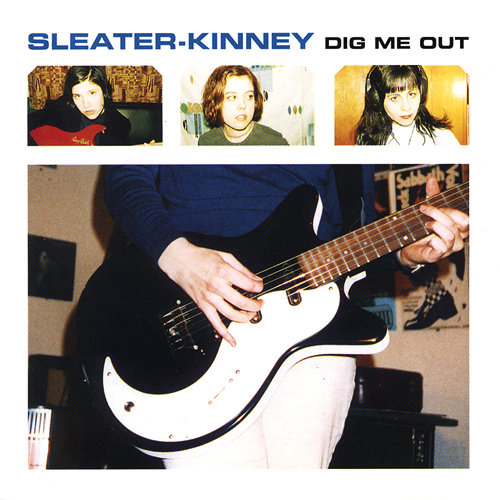Sleater-Kinney : Dig Me Out

Sleater-Kinney‘s self-titled debut laid down a solid foundation for the Pacific Northwest trio’s artful yet furious punk. Their second album Call the Doctor only expanded the possibilities of their music, incorporating darker textures and greater nuances between impassioned yelps of desire to be someone’s very own personal Joey Ramone. But they didn’t achieve perfection until their third album, Dig Me Out, a 13-track rollercoaster of two-guitar, no-bass punk rock. The band’s first album with new drummer Janet Weiss, Dig Me Out almost sounds like the work of a completely different band—and in all fairness, it is 33 percent of a new band. It’s crisper, punchier, more streamlined, yet still fierce and with some of the most urgent, rhythmically taut drumming on an album of its kind. Thus would begin one of the most rock solid lineups in rock ‘n’ roll for the next nine years.
While Sleater-Kinney’s roots may have been in the riot grrrl movement in the Pacific Northwest, the band took a different stylistic tack than the raw punk of Bikini Kill or the grunge of L7. For a slight hint of what one’s getting into on Dig Me Out, just look a little bit beyond the guitar on the album’s cover (which pays homage to The Kinks’ Kink Kontroversy) to find the LP sleeve of Black Sabbath’s Vol. 4 pinned up on the wall. Sleater-Kinney aren’t metal, but having emerged from a D.I.Y. punk scene and with an ear for the heavy rock canon, Sleater-Kinney created a brand new sound all their own, one that steps outside any comfortable D.I.Y. constraints in favor of something bigger.
The group plays their most confrontational cards up front with the title track, guitars blazing and drums rumbling beneath Corin Tucker’s raw lyrics like “do you get nervous watching me bleed?” Yet “One More Hour” shows a more tender side of the band, written by Tucker about her prior relationship with guitarist Carrie Brownstein, as she revealed in a somewhat awkward interview several years later. This balance of the personal and the political is another component that sets Sleater-Kinney apart, with feminism and personal politics coming to fuse into one brutally honest package that could only be paired with their aggressive but fun brand of indie punk.
Brownstein and Tucker also show more of a call-and-response vocal relationship on Dig Me Out, particularly on “The Drama You’ve Been Craving,” which finds them dispensing the clever interplay “the clock I’m punching in/ (I’m a monster)/ work ’till I can’t give/ (I’m a machine).” The mechanical rhythm of “Heart Factory,” apparently created by the sound of Weiss drumming on a space heater, mimics the sound of an actual assembly line, as Brownstein and Tucker play polarized foils to one another between verse and chorus. While Brownstein stoically throws out the sales pitch “we’re manufacturing hearts/ we’ve got the perfect thing,” Tucker turns the soulless product she’s hawking into human emotion with the explosive cry of “find me out! I’m not just made of parts/ oh, you can break right through, this box you put me into.”
The middle section of the album contains some of the band’s strongest live staples and “hits,” for lack of a better word, from “Words and Guitar,” one of the best songs ever written about rock ‘n’ roll, to the short, sax-blaring “It’s Enough,” to “Little Babies,” with its infectious, nursery-rhyme-like chorus. Though the album may peak here, the quality of the songs doesn’t dip in the slightest, with vicious rockers like “Not What You Want,” the aptly titled “Dance Song ’97” and commanding, fuzzed-out closer “Jenny” following suit.
Dig Me Out was just the first of a five-album run of truly amazing material from this Olympia-via-Portland trio, and along with The Woods remains their best. Though there have been bands with either the raw punk rock power, the musical chops or the lean, potent songwriting of Sleater-Kinney, rare is the band that can boast all of these at once.
Similar Albums:
 The Breeders – Last Splash
The Breeders – Last Splash
 PJ Harvey – Rid of Me
PJ Harvey – Rid of Me
 White Lung – Sorry
White Lung – Sorry
Jeff Terich is the founder and editor of Treble. He's been writing about music for 20 years and has been published at American Songwriter, Bandcamp Daily, Reverb, Spin, Stereogum, uDiscoverMusic, VinylMePlease and some others that he's forgetting right now. He's still not tired of it.

